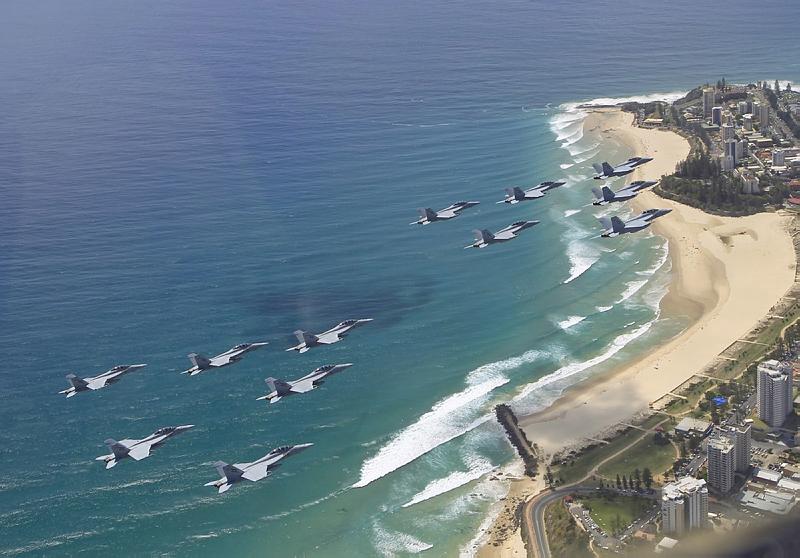
The recent Australian National Audit Office reports on the current and future air combat capability highlighted the risk and potential cost of keeping the 1980s vintage Hornets flying until they are replaced by the F-35 Joint Strike Fighter. It isn’t the ANAO’s job to look at the policy options for dealing with the risks they identified, but their findings clearly beg the question of what to do.
There are three broad options: stick with the current plan of managing the ageing Hornets until the F-35 is mature and established in service elsewhere; bite the bullet and move to the F-35 sooner to reduce the risk that the Hornets won’t go the distance; or make a further purchase of Super Hornets to add to the existing fleet of 24 Super Hornets acquired in 2006 to de-risk the then planned transition from F-111 to F-35 between 2010 and 2014. For reasons explained below, the logic of the situation is increasingly pointing to a further Super-hornet buy.
Sticking with the current plan has the advantage of not requiring extra resources in the next few years—a real attraction from the point of view of a government with a finely balanced budget. The downside is that the Hornets will become increasingly expensive to maintain towards the end of the decade, while offering a progressively lower return in capability terms.
Moving a purchase of the F-35 forward means that we would essentially reverse the judgements that have been made (and in some cases forced upon us by events) in recent years regarding the desirability of buying early in the production phase. Given that the USAF won’t operate the F-35 until 2018 or so, we’d be really jumping in the deep end to move earlier—and we’d pay more for the privilege.
The final option is more Super Hornets. The recent decision to upgrade 12 of the RAAF’s 24 Super Hornets to EF-18G ‘Growler’ electronic warfare status opens the door for a purchase of another tranche. Either the current aircraft could be left in their strike fighter configuration and the Growlers bought off the production line—which would obviate the need to take aircraft offline for upgrading and might also be less expensive than modifying existing aircraft—or simply by buying new strike fighters to maintain the fleet’s numbers while upgrading half the current fleet.
That decision would have longer term force structure consequences. The Growler decision strengthened the case for retaining the Super Hornets beyond their originally conceived interim role in order to have an electronic warfare capability. Buying more Super Hornets all but closes the door on replacing them in the short to medium term with F-35s. We’d be effectively deciding to operate a mixed fleet to 2030 or even beyond—negating one of the drivers for the F-35 decision in the first place—and the policy of ‘around 100 F-35s’ would as good as dead.
Whatever we do, it’s going to be a matter of deciding what degree of risk we’re going to accept and/or how much we’re prepared to pay to mitigate it. And here’s where we have to get away from talking about air combat as an abstraction. The risks we are trying to mitigate are those posed to Australia’s security by the armed forces of other nations, not whether someone, somewhere has an aircraft in inventory better than ours. Historically we’ve either supported our major allies when their interests were threatened (thereby also protecting our own) or—once, briefly—by defending our own territory when it came under attack.
Looking out for at least the next decade and potentially beyond, it’s hard to see a threat to Australia’s territory that Super Hornets supported by new tankers and airborne early warning aircraft couldn’t deal with—none of the near neighbours have the capability of projecting the forces needed to so do and we’d have warning time of any attempt to develop them. Any major power would incur the interest of other major powers long before they were getting out the air staff planning maps for our part of the world. So that leaves us with support to our major ally. Here a contribution of Super Hornets and (especially) Growlers would be both credible and useful. Looked at that way, a fully-operational F-35 is ‘sufficient but not necessary’ for the foreseeable future.
What happens next comes down to whether the government wants to shoulder the risks with the Hornet fleet identified by the ANAO and others, or to effectively insure against that by buying more Super Hornets. Both are plausible options given the lack of a credible air threat, but they have different risk and cost profiles.
Andrew Davies is senior analyst for defence capability at ASPI and executive editor of The Strategist. Image courtesy of Department of Defence.